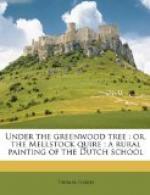On a cold and starry Christmas-eve within living memory a man was passing up a lane towards Mellstock Cross in the darkness of a plantation that whispered thus distinctively to his intelligence. All the evidences of his nature were those afforded by the spirit of his footsteps, which succeeded each other lightly and quickly, and by the liveliness of his voice as he sang in a rural cadence:
“With the rose and the
lily
And the daffodowndilly,
The lads and the lasses a-sheep-shearing go.”
The lonely lane he was following connected one of the hamlets of Mellstock parish with Upper Mellstock and Lewgate, and to his eyes, casually glancing upward, the silver and black-stemmed birches with their characteristic tufts, the pale grey boughs of beech, the dark-creviced elm, all appeared now as black and flat outlines upon the sky, wherein the white stars twinkled so vehemently that their flickering seemed like the flapping of wings. Within the woody pass, at a level anything lower than the horizon, all was dark as the grave. The copse-wood forming the sides of the bower interlaced its branches so densely, even at this season of the year, that the draught from the north-east flew along the channel with scarcely an interruption from lateral breezes.
After passing the plantation and reaching Mellstock Cross the white surface of the lane revealed itself between the dark hedgerows like a ribbon jagged at the edges; the irregularity being caused by temporary accumulations of leaves extending from the ditch on either side.
The song (many times interrupted by flitting thoughts which took the place of several bars, and resumed at a point it would have reached had its continuity been unbroken) now received a more palpable check, in the shape of “Ho-i-i-i-i-i!” from the crossing lane to Lower Mellstock, on the right of the singer who had just emerged from the trees.
“Ho-i-i-i-i-i!” he answered, stopping and looking round, though with no idea of seeing anything more than imagination pictured.
“Is that thee, young Dick Dewy?” came from the darkness.
“Ay, sure, Michael Mail.”
“Then why not stop for fellow-craters—going to thy own father’s house too, as we be, and knowen us so well?”
Dick Dewy faced about and continued his tune in an under-whistle, implying that the business of his mouth could not be checked at a moment’s notice by the placid emotion of friendship.
Having come more into the open he could now be seen rising against the sky, his profile appearing on the light background like the portrait of a gentleman in black cardboard. It assumed the form of a low-crowned hat, an ordinary-shaped nose, an ordinary chin, an ordinary neck, and ordinary shoulders. What he consisted of further down was invisible from lack of sky low enough to picture him on.
Shuffling, halting, irregular footsteps of various kinds were now heard coming up the hill, and presently there emerged from the shade severally five men of different ages and gaits, all of them working villagers of the parish of Mellstock. They, too, had lost their rotundity with the daylight, and advanced against the sky in flat outlines, which suggested some processional design on Greek or Etruscan pottery. They represented the chief portion of Mellstock parish choir.




